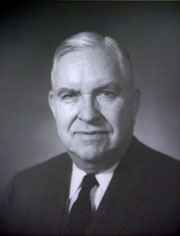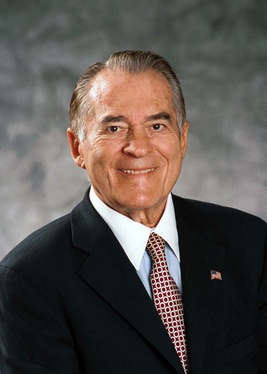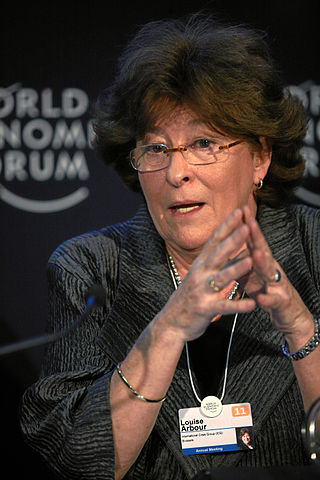Related Research Articles

Roberta Achtenberg is an American attorney and civil rights advocate who served as a commissioner on the United States Commission on Civil Rights. She was previously assistant secretary of the U.S. Department of Housing and Urban Development, becoming the first openly lesbian or gay public official in the United States whose appointment to a federal position was confirmed by the United States Senate. This confirmation hearing garnered a lot of publicity, opposition, and support.

The International Commission of Jurists (ICJ) is an international human rights non-governmental organization. It is supported by an International Secretariat based in Geneva, Switzerland, and staffed by lawyers drawn from a wide range of jurisdictions and legal traditions. The Secretariat and the Commission undertake advocacy and policy work aimed at strengthening the role of lawyers and judges in protecting and promoting human rights and the rule of law. In addition, the ICJ has national sections and affiliates in over 70 countries.

Sadie Tanner Mossell Alexander was a pioneering Black professional and civil rights activist of the early-to-mid-20th century. In 1921, Mossell Alexander was the second African-American woman to receive a Ph.D. and the first one to receive one in economics in the United States. In 1927, she was first Black woman to receive a law degree from the University of Pennsylvania Law School and went on to become the first Black woman to practice law in the state. She was also the first national president of Delta Sigma Theta sorority, serving from 1919 to 1923.

The Association of the Bar of the City of New York, commonly referred to as the New York City Bar Association, founded in 1870, is a voluntary association of lawyers and law students. Since 1896, the organization has been headquartered in a landmark building on 44th Street, between Fifth and Sixth Avenues in Manhattan. Today the City Bar has more than 23,000 members. Its current president, Muhammad U. Faridi, began his two-year term in May 2024.
The Lawyers' Committee for Civil Rights Under Law, or simply the Lawyers' Committee, is an American civil rights organization founded in 1963 at the request of President John F. Kennedy.
Sandra Lea Lynch is an American lawyer who serves as a senior United States circuit judge of the United States Court of Appeals for the First Circuit. She is the first woman to serve on that court. Lynch served as chief judge of the First Circuit from 2008 to 2015.

Navanethem "Navi" Pillay is a South African jurist who served as the United Nations High Commissioner for Human Rights from 2008 to 2014. A South African of Indian Tamil origin, Pillay was the first non-white woman judge of the High Court of South Africa. She has also served as a judge of the International Criminal Court and President of the International Criminal Tribunal for Rwanda. Her four-year term as High Commissioner for Human Rights began on 1 September 2008 and was extended an additional two years in 2012. In September 2014 Prince Zeid bin Ra'ad succeeded her in her position as High Commissioner for Human Rights. In April 2015, Pillay became the 16th Commissioner of the International Commission Against the Death Penalty. She is also one of the 25 leading figures on the Information and Democracy Commission launched by Reporters Without Borders.
Carol Weiss King was a well-known immigration lawyer, renowned for her advocacy in defending the civil rights of immigrants, key founder of the International Juridical Association, and a founding member of the National Lawyers Guild in the United States. Her left-leaning career spanned from the Palmer Raids to the McCarthy Era.

Mahala Ashley Dickerson was an American lawyer and civil rights advocate for women and minorities. In 1948 she became the first African American female attorney admitted to the Alabama State Bar; in 1951 she was the second African American woman admitted to the Indiana bar; and in 1959 she was Alaska's first African American attorney. In 1983 Dickerson was the first African American to be elected president of the National Association of Women Lawyers. Her long legal career also helped to pave the way for other women attorneys. In 1995 the American Bar Association named her a Margaret Brent Women Lawyers of Achievement honoree.
The Gruber Prize for Justice, established in 2001, was one of five international prizes worth US$500,000 awarded by The Peter and Patricia Gruber Foundation, an American non-profit organization.

Erwin Nathaniel Griswold was an American appellate attorney and legal scholar who argued many cases before the U.S. Supreme Court. Griswold served as Solicitor General of the United States (1967–1973) under Presidents Lyndon B. Johnson and Richard M. Nixon. He also served as the dean of Harvard Law School for 21 years. Several times he was considered for appointment to the U.S. Supreme Court. During a career that spanned more than six decades, he served as member of the U.S. Commission on Civil Rights and as president of the American Bar Foundation.
Gay Johnson McDougall is an American lawyer who has spent her career addressing international human rights and racial discrimination. She is currently a Distinguished Scholar-in-Residence at the Leitner Center on International Law and Justice of Fordham University Law School. She was executive director of Global Rights, Partners for Justice. In August 2005, she was named the first United Nations Independent Expert on Minority Issues, serving until 2011.

Jerome Joseph "Jerry" Shestack was a Philadelphia lawyer and human rights advocate active in Democratic Party politics who served as president of the American Bar Association (ABA) from 1997 to 1998. He chaired the International League for Human Rights for twenty years, and was appointed the United States Ambassador to the United Nations Commission on Human Rights from 1979 to 1980 by President Jimmy Carter. Shestack was regularly listed on the National Law Journal's list of the 100 most influential U.S. lawyers. He had multiple grandchildren the youngest being Andrew Justice Doss.
Allie B. Latimer was the first woman and the first African American to serve as General Counsel of a major United States federal agency. In her work to bring the government into compliance with the Civil Rights Act, she founded and developed Federally Employed Women (FEW) and worked to end gender discrimination in public sector jobs throughout her 40+ year career. According to the National Women's Hall of Fame, “FEW’s many accomplishments and activities have impacted the federal workplace and contributed to improved working conditions for all.”

Judith L. Lichtman is an American attorney specializing in women's rights and an advocate for human and civil rights. Lichtman currently serves as the senior advisor of the National Partnership for Women & Families. She is largely credited with the passage of the Family and Medical Leave Act of 1993.
Eleanor Bontecou was an American lawyer, civil rights advocate, law professor and government official. Bontecou served as an attorney and investigator for both the U.S. Department of Justice and U.S. War Department. She also worked as a professor at two universities. During her career, Bontecou achieved national fame for her work in the civil liberties and women's rights movements.

Women in law describes the role played by women in the legal profession and related occupations, which includes lawyers, paralegals, prosecutors, judges, legal scholars, law professors and law school deans.

Isaac Shorr was a 20th-century American immigration and naturalization lawyer and philosophical anarchist who worked with other important, radical lawyers in the 1920s–1940s and whose legal partners included: Swinburne Hale, Walter Nelles, Joseph R. Brodsky, and Carol Weiss King.
Adjoa Aiyetoro is a lawyer, an activist and the former executive director of the National Conference of Black Lawyers (1993-1997). She was the chief legal consultant to the National Coalition of Blacks for Reparations in America (N'COBRA) and co-chairperson of their Reparations Coordinating Committee. She is now Professor Emerita at the William H. Bowen School of Law at the University of Arkansas, Little Rock.
References
- ↑ "Barbara Ruth Arnwine, Born 03/28/1951 in California | CaliforniaBirthIndex.org". www.californiabirthindex.org. Retrieved 2022-10-25.
- ↑ "Answers - The Most Trusted Place for Answering Life's Questions". Answers.com. Retrieved 2019-10-25.
- ↑ United States. Congress. Joint Committee on the Organization of Congress (1993). Application of laws and the administration of the Hill : hearings before the Joint Committee on the Organization of Congress, One Hundred Third Congress, first session ... May 27, 1993; June 8, 1993; June 17, 1993. Boston Public Library. Washington : U.S. G.P.O. : For sale by the U.S. G.P.O., Supt. of Docs. ISBN 978-0-16-041200-4.
- ↑ Henderson, Wade (September 5, 2001). "Remarks of Wade Henderson at the UN World Conference Against Racism". www.civilrights.org. Durban, South Africa: The Leadership Conference on Civil and Human Rights. Archived from the original on 2012-07-20. Retrieved 2012-02-27.
- ↑ "Stocks". Bloomberg. Retrieved 2019-10-25.
- 1 2 3 "Barbara R. Arnwine: Executive Director". Archived from the original on 2011-11-05. Retrieved 2011-10-25.
- ↑ "Partners". Election Protection. Retrieved 2019-10-25.
- ↑ "Barbara Arnwine Receives Gruber International Justice Prize". Archived from the original on 2011-12-20. Retrieved 2011-11-28.